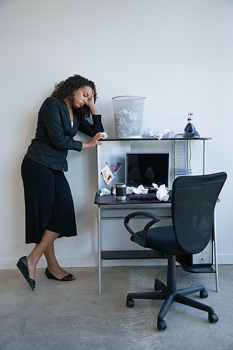
It’s no secret that a great looking office space works wonders when courting new clients or impressing investors, but innovative workspaces play another vital role in corporate ecosystems: attracting talent.
When your finalist candidate walks through the door of your company, he or she is immediately judging the environment; is it a place they want to work in?
And once that candidate is hired? A well-designed workplace can dramatically effect employee innovation, morale, and even retention. Effective design and approaches to daily work life in the office can work wonders in cultivating a loyal and long-standing employee base.
“The most dynamic workspaces I have seen all contain a number of common threads tying them together that transcend mere placement of office furniture and a fully stocked kitchen,” said Jeff Chaitman, workplace design expert and vice president at IdeaPaint. “These trends get to the heart of what it means to be a motivated and loyal employee in today’s workforce and encourage ideas to come to life wherever they might spring from.”
Here are three recommendations to consider when designing appealing and effective workspaces:
1. Create choice
According to a 2013 Workplace Survey by design and architectural firm Genslar, the average square foot of space per person dropped from 225 to 176 square feet between 2010 and 2012 and is expected to be near 100 by 2017.
Just because personal space may be declining does not mean that the overall amount of space in an office is decreasing. Rather, many companies are opting to use that reclaimed space to create more and diverse work environments incorporating myriad different uses.
And employees love it. They now have more choices in where they work, think, create, and engage with colleagues during the course of their workday, giving variation and adaptation to any meeting.
According to the same survey, choice drives performance and innovation. Employers who provide a spectrum of choices for when and where employees can work are seen as more innovative and have higher-performing employees. In fact, companies who grant employees choice grew four times and had one-third the turnover versus control-oriented organizations.
2. Give them a seat at the table
Good ideas can come from anyone, from upper management to interns and new hires. Offices that have varied workspaces and foster more democratic brainstorming meetings are well poised to capitalize on a greater employee knowledge base.
Boston-based energy management company EnerNOC sought to empower their Millennial workers – roughly 50% of their entire workforce – by getting them more involved during brainstorming meetings, working alongside senior management and executives which allows for a more open exchange of ideas and experiences. They found that their younger employees were extremely eager to learn from their managers and develop their own creative voices.
“The access these employees have to managers, specifically the variety of access they have to them, creates unique relationships between new hires and veterans that forge a strong professional bond and creates a sense of empowerment that keeps them engaged day after day,” said Chaitman.
In the 2012 Global Workforce Survey by Towers Watson, 32,000 employees were polled to gauge their opinions on company leadership, among other topics. Researchers found that when it comes to employee retention, a high quality work experience is paramount. Managers who spend time to engage employees and focus on building on their strengths play a major role in the creation of a work environment that promotes high retention.
3. Keep them coming back
At the end of the day, work is, just that. We spend on average one-third of our day at work. It is a necessary part of our lives, but it doesn’t have to be a negative one. In fact, well-designed workplaces can inspire employees on a daily basis and be a place they want to come to every morning.
Take the Quicken Loans Family of Companies’ corporate headquarters in downtown Detroit. The campus is a revelatory composite of breathtaking design and highly functional, highly collaborative workspaces. In fact, a new design firm, dPOP!, was founded as a result of its build out.
The space features a repurposed bank vault for meetings, a nod to Detroit’s industrial routes through the use of iron artwork, antique equipment, and brick-and-beam architecture, and large bright open office spaces complete with floor-to-ceiling windows and even Ping-Pong tables.
“The result is a workplace employees want to go to on a daily basis,” said Chaitman. “Companies of all shapes and sizes, from Apple to Zappos, are realizing the benefits of great office design. The common thread throughout is a boost in innovation and creative thinking, employee retention, and overall engagement.”
Hiring companies, in your effort to think holistically about how you attract and retain talent in this new world of work, consider investing in your office lay-out well beyond stocking free soda and coffee in the break room.



